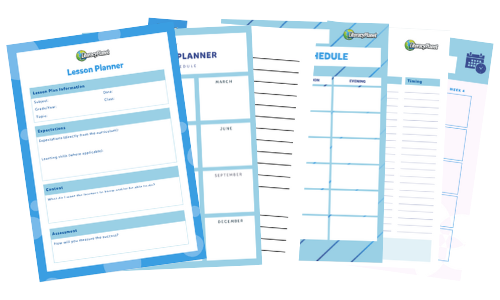Planning a lesson that is curriculum-aligned, engaging and memorable can be quite difficult, especially with limited time. Is it most effective to plan out week by week, month by month or the entire year? Here are some tips we’ve gathered from teachers.
1. Step back and analyze the curriculum.
Give yourself some quiet time with no distractions so your head is clear and creative. Take out your curriculum and break it down into segments with an objective in each part. Ask yourself what you want your students to learn from each segment and how. Then think about the timing of each segment; will some take longer than others? When is the best time to teach these and how do they align with assessments?
2. Utilize the resources.
There are lots of resources out there from sites like WeAreTeachers, tes, and twinkle which have some great content. We also created curriculum planners, daily, weekly, monthly and yearly planners just for you!

3. Reach out to your network.
While you might feel alone sometimes, this job has been done by many around you! The curriculum doesn’t change much year on year, and you could learn from lessons that are already being taught. Don’t be shy, you are all on the same boat and there’s nothing more empowering than a team working together. Connect with teachers on Facebook groups and other social channels. You can start by sharing some of the tips you’ve found, or even this very blog!
4. Get creative.
There’s so much you can do that can inspire and engage with your students. Research what your students are interested in outside of school by asking them what they got up to on the weekends or holidays. You can even make a game out of it, by sitting in a circle and going around to share what their favourite part of the holidays was. If that didn’t work out, you can start an anonymous survey by getting the students to write or draw out their thoughts and chuck them in an empty bowl or box. For example, you might gather that your Year 3 class is interested in Rubix cubes and you could research the mathematics behind the cube and input it into your maths lesson. That’s something that they will really remember.
5. Measure and reflect.
After each class or day, depending on the lessons – you should keep a log of what was covered and the learnings from that. I know you might think that you remember everything but let’s not put that much pressure on your brain! This also helps you learn from your own lesson planning and could be used to modify the next lesson in a documented way.
Let’s be real, there is no one rule book for lesson planning as each teacher works differently and when things don’t work out you can always pause, reflect and change your strategy. Sometimes you just need to start on a fresh piece of paper and a quiet space to plan.




